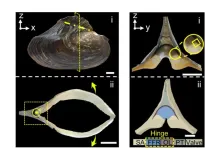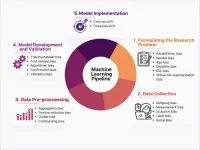(Press-News.org) CLEVELAND - A Cleveland Clinic research team recently published an “atlas” of metabolites associated with cardiovascular disease in the European Heart Journal. The novel findings provide key details about the routes and potential branching paths taken by bacteria and metabolic by-products, metabolites.
The study mapped out the multiple by-products of bacteria processing amino acids associated with cardiovascular disease and then compared that to patient data to assess disease risk in two large cohorts – one in the US and another in Europe.
Bacteria in and on our bodies produce metabolites through processing certain molecules, referred to as precursors. Precursors can come in components of our diet, like protein, or as other metabolized substances. Probiotics (living organisms) and prebiotics (fiber, starch) have increasingly been introduced in foods or supplements as possible clinical interventions.
“The road map generated in the present studies acts as a “GPS” to help guide clinicians and scientists in how to intelligently shift the gut microbiome output into one that makes more beneficial substances,” says Stanley Hazen, MD, PhD, a co-author on the study, Chair of the Department of Cardiovascular & Metabolic Sciences and co-section head of Preventive Cardiology at Cleveland Clinic.
Along with confirming additional metabolites associated with cardiovascular risk, researchers developed a method for assessing exactly how much of the metabolites are in the bloodstream. Other methods tend to provide relative levels of metabolite compared to other substances, but not absolute amounts – an advance that allows identification of cutoff values for low versus high risk.
This research, including the absolute amounts of metabolites, helps fight any unintended consequences of altering the microbiome, says Ina Nemet, PhD, first author and assistant staff in Cardiovascular & Metabolic Sciences. To shift what metabolites are in our bloodstream in the hopes of preventing a certain condition, we also need to understand what precursors lead to bacteria producing those metabolites.
“If microbes do not make phenylacetic acid for example, they will start making something else,” Dr. Nemet says. “Whether these alternative metabolites are associated with benign or harmful outcomes is critical information for informed therapeutics development.”
The study started with a metabolite called phenylacetylglutamine (PAG), which the research team previously discovered was linked with elevated chance of events like heart attack or stroke.
PAG is produced from phenylalanine, an amino acid found in many foods, including plant and animal-based proteins. The study also studied gut microbial metabolism of tyrosine and tryptophan, amino acids that share some common metabolic pathways with phenylalanine, to get a “big picture” look, Dr. Nemet says.
“In addition to PAG, microbes can generate a plethora of other metabolites starting from the same precursor,” she says. “This inspired us to investigate these pathways to get a more comprehensive picture on how those metabolites interconnect and are associated with cardiovascular disease.”
END
New “atlas” maps bacteria and metabolites associated with elevated risk of cardiovascular disease
Cleveland Clinic researchers develop an “atlas” of the human microbiome pathways linked to cardiac and mortality risks
2023-06-22
ELSE PRESS RELEASES FROM THIS DATE:
Brigham researchers identify factors associated with lower breastfeeding duration for mothers with higher BMIs
2023-06-22
A multi-nation cohort analysis found that inflammation and cesarean section delivery in mothers with higher body mass index are connected to shorter duration of breastfeeding, providing potential targets for intervention.
Breastfeeding has significant benefits for both maternal and child health. Research has indicated that women with higher body mass index (BMI) have shorter durations of breastfeeding, but few underlying mechanisms have been identified. To address this gap, a new study led by investigators from Brigham and Women’s ...
Muhammad Rabnawaz to be inducted into National Academy of Inventors
2023-06-22
For creating technologies that have the potential to change the world and providing opportunities for future inventors, Muhammad Rabnawaz, an associate professor and Faculty Laureate in the College of Agriculture and Natural Resources at Michigan State University, will be inducted into the National Academy of Inventors as a senior member on June 26.
The NAI senior member program was established to highlight academic inventors who have demonstrated a prolific spirit of innovation in creating or facilitating outstanding inventions that hold the promise of making a tangible impact on the public’s quality of life, economic development and the welfare of society. Election ...
The nose knows: Career Awardee developing bioinspired optical sniffer sensor
2023-06-22
The human nose, which has around 6 million olfactory receptors, can distinguish between at least 1 trillion different odors. Dogs have about 300 million of these receptors, with some scientists estimating their sense of smell is up to 100,000 times more powerful than humans’. This allows dogs to detect the scent of dangerous materials like bombs and illicit substances, as well as medical conditions such as COVID-19 and Parkinson’s disease.
University of Arizona assistant professor Judith Su is developing an optical nose “as sensitive as ...
The impact of populism on multinational corporations’ investment
2023-06-22
A stable economic and political environment is necessary for firms to feel secure while making long-term investment decisions, such as those related to investing in foreign countries (also known as foreign direct investment or FDI). Any threat to change legislative procedures in the foreign country can make it difficult for firms to predict the outcomes of such decisions. Populist leaders, who claim to represent the will of the people, often come to power by threatening to alter the established rules and procedures, generating ...
Is the U.S. ready for an African swine fever outbreak?
2023-06-22
In a new study, researchers from North Carolina State University used a computer model to understand how African swine fever (ASF) might spread among swine farms in the southeastern U.S. – and examined the effectiveness of existing response plans. They found that although control actions would help, an outbreak could still prove persistent and costly.
ASF is a highly contagious viral disease in pigs, with a mortality rate that can reach 100%. Additionally, infected pigs may not show symptoms before they die, potentially allowing the ...
NFL and NFL Players Association fund Emory University-led study of innovative pain management solutions
2023-06-22
The National Football League and the NFL Players Association (NFLPA) announced today they are awarding a grant to Emory University researchers to study innovative, first-of-their-kind, alternative pain management methods that could benefit NFL players and society at large. The researchers will investigate mindfulness-based intervention in sports medicine injuries.
The $200,000 grant was awarded by the NFL-NFLPA Joint Pain Management Committee (PMC), which aims to facilitate research to better understand and improve potential alternative pain management treatments for NFL players.
Emory’s winning ...
Research links increase in depression, COVID diagnosis in student-athletes
2023-06-22
Background
COVID-19 survivors may experience persistent neuropsychological disruptions such as lower satisfaction with life (SWLS), depression, and anxiety. While student-athletes are at low risk for severe COVID complications, the effect of COVID on mental health remains to be elucidated.
Objective
Compare patient-reported mental health outcomes for incoming collegiate athletes who did (COVID+) and did not (COVID-) have COVID-19.
Methods
79 COVID+ (79/178, 44.4%, 18.90±0.16 years) and 99 COVID- (99/178, 55.6%,18.95±0.16 ...
Heat spots reveal growth rate of a galaxy 12 billion years ago
2023-06-22
An international team of astronomers has drawn a temperature map of the dust drifting within one of the oldest spiral galaxies of the Universe which provides new insights into how fast the galaxy is growing. Until now researchers have only been able to measure the temperature of most distant galaxies in broad terms, without showing how temperatures vary in individual areas.
This research, described in a paper published today in Monthly Notices of the Royal Astronomical Society (MNRAS) shows unambiguous temperature variation within the distant galaxy indicating two distinct heat sources – a supermassive black hole at the centre of the galaxy, and the heat generated ...
Scientists learn from hinge in bivalve about fatigue resistance of materials
2023-06-22
Recently, flexible and foldable devices have developed at a dramatic rate. More and more foldable devices appear in people's lives. Long-term service requires the folded parts to endure repeated deformation which might cause fatigue damage to the devices. Consequently, the damage will affect the normal function of the devices. Inspired by the hinge of bivalve Cristaria plicata, which experiences hundreds of thousands of repeating opening-and-closing valve motions throughout the bivalve’s lifetime, a research team led by Prof. YU Shuhong collaborating with Prof. WU Hengan from the University of Science and Technology of China ...
Bias in AI algorithms could be mitigated by implementing new checklist
2023-06-22
In your coverage, please use this URL to provide access to the freely available article in PLOS Digital Health: https://journals.plos.org/digitalhealth/article?id=10.1371/journal.pdig.0000278
Article Title: Bias in artificial intelligence algorithms and recommendations for mitigation
Author Countries: Jordan, United States, Canada
Funding: The authors received no specific funding for this work. END ...
LAST 30 PRESS RELEASES:
Scientists discover why we know when to stop scratching an itch
A hidden reason inner ear cells die – and what it means for preventing hearing loss
Researchers discover how tuberculosis bacteria use a “stealth” mechanism to evade the immune system
New microscopy technique lets scientists see cells in unprecedented detail and color
Sometimes less is more: Scientists rethink how to pack medicine into tiny delivery capsules
Scientists build low-cost microscope to study living cells in zero gravity
The Biophysical Journal names Denis V. Titov the 2025 Paper of the Year-Early Career Investigator awardee
Scientists show how your body senses cold—and why menthol feels cool
Scientists deliver new molecule for getting DNA into cells
Study reveals insights about brain regions linked to OCD, informing potential treatments
Does ocean saltiness influence El Niño?
2026 Young Investigators: ONR celebrates new talent tackling warfighter challenges
Genetics help explain who gets the ‘telltale tingle’ from music, art and literature
Many Americans misunderstand medical aid in dying laws
Researchers publish landmark infectious disease study in ‘Science’
New NSF award supports innovative role-playing game approach to strengthening research security in academia
Kumar named to ACMA Emerging Leaders Program for 2026
AI language models could transform aquatic environmental risk assessment
New isotope tools reveal hidden pathways reshaping the global nitrogen cycle
Study reveals how antibiotic structure controls removal from water using biochar
Why chronic pain lasts longer in women: Immune cells offer clues
Toxic exposure creates epigenetic disease risk over 20 generations
More time spent on social media linked to steroid use intentions among boys and men
New study suggests a “kick it while it’s down” approach to cancer treatment could improve cure rates
Milken Institute, Ann Theodore Foundation launch new grant to support clinical trial for potential sarcoidosis treatment
New strategies boost effectiveness of CAR-NK therapy against cancer
Study: Adolescent cannabis use linked to doubling risk of psychotic and bipolar disorders
Invisible harms: drug-related deaths spike after hurricanes and tropical storms
Adolescent cannabis use and risk of psychotic, bipolar, depressive, and anxiety disorders
Anxiety, depression, and care barriers in adults with intellectual and developmental disabilities
[Press-News.org] New “atlas” maps bacteria and metabolites associated with elevated risk of cardiovascular diseaseCleveland Clinic researchers develop an “atlas” of the human microbiome pathways linked to cardiac and mortality risks


